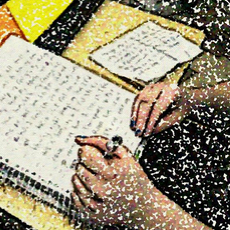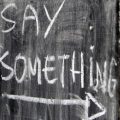The Essence of the Process Is Revision

I’ve said before that writing a book isn’t difficult when you break it down into 1,000 words a day. In fact, if you write 1,000 words a day fairly consistently, you can write more than one book a year.
A few smart readers have pointed out that the writing is the easiest part. Truly crafting something worthwhile requires much more work in the editing or revision phase. It’s one thing to get 50,000 words on the page, and it’s another to turn them into something that other people want to read.
I still maintain that it’s more important for most of us to focus on forward motion, on making choices that allow for consistent, daily effort. Most people remain stuck at the beginning, unable to envision a reality of themselves actually writing a book or creating another big project.
Nevertheless, the comments that revision is more difficult and more important are true. First you create, then you revise. The essence of the process is revision.
49,000 Words and Miles to Go
I’ve been working on my new book for much of the past several months. The other day I was surprised to see that my draft is now more than 49,000 words. The target is approximately 70,000 words in the final manuscript. All’s well, right?
Well, I’m on track, but I have far to go. This first draft is really just a first draft. I expect to rewrite much of the entire manuscript at least once over the next two months, and then I expect to revise much of that version over the following month. Much work remains and many miles to go.
Meanwhile, we’ve been working with our beta members in the new Adventure Capital project. This course launched in beta (finally!) a month ago, and we’ve been gearing up for a bigger relaunch to the public over the past few weeks.
I had originally thought it could be ready as early as a week ago, but we still have a few more tweaks to make before going live. Our new target date for a public launch is Wednesday, May 29.
Both of these big projects have reminded me of an essential truth: revising is harder, but ultimately more worthwhile, than the initial act of making something.
From a recent New Yorker essay by John McPhee:
The way to do a piece of writing is three or four times over, never once. For me, the hardest part comes first, getting something—anything—out in front of me… Then, as you work it over and alter it, you begin to shape sentences that score higher with the ear and eye. Edit it again—top to bottom. The chances are that about now you’ll be seeing something that you are sort of eager for others to see. And all of that takes time.
All of that takes time, so that’s what I’ll be doing, day in and day out for the next six weeks.
How about you? Are you creating or revising? How do you do it?
Feel free to share in the comments.
###
Image: DKrebs








44 Comments
I definitely agree with ol’ Hemingway when he said “The first draft is always shit.” I used to believe that writing didn’t need to be rewritten and merely checked for grammatical errors and the like. I was WRONG.
Your writing should be completely different than the first draft because chances are, you want something amazing right? Something absolutely incredible that people want to read and learn from. Letting yourself know that you will be revising over and over as you begin the process at all lets you focus on writing. I know that when I’m constantly editing as I go then I never get to where I want to be.
Now I’m a big believer in writing it first, editing twice or three times or even more before I hit publish on anything. I can’t imagine how many times I’d rewrite an entire book.
Speaking about the writing process with a colleague a few weeks ago, he shared an Abraham Lincoln quote with me: “Give me six hours to chop down a tree and I will spend the first four sharpening the axe.”
My writing happens in this way, maybe because it is non-fiction but I’m not sure. I wade through research and toil away, seeming to get no where. It always becomes hopeless and fretful at some point before it gets better. It is after all of that “work” that the ideas come together and the writing pours out of me.
However that is not the end. It wouldn’t be sharable at that point. Well… in student days we might call it “done” and hand it in to the professor!
Now this is the point where the revisions begin. It is the hard work that is rewarding for me. I enjoy this part.
However we get that rough draft down is a way of “sharpening the axe” since much of the heavy lifting comes in the revision process. I would like to be able to crank out 1000 words a day but haven’t been able to make that my habit. Maybe I’ll try it for a few weeks and see if it would benefit my writing.
Do you apply any re-write strategies for blogposts and such too? Or no?
Just curious really.
@William,
Not so much. Once in a while for a big post I do. For shorter ones, the editing is fairly quick—for better or worse!
Chris, these are wise words! One additional thing that I’ve discovered in the (often painful, laborious) process of book-writing is that I tend to a terrible judge of the quality of my own writing. Things that I believe to be sharp and precise are actually muddy to others, and things that I think are throwaways are profound to them. I’ve learned that it’s important to get trusted peers involved in the revision process earlier rather than later so that I have a mirror in which to see my own work. It also helps the process of idea refinement and making the language more evocative.
Thanks for sharing your experience!
My book – Idea to iPhone – was edited over a dozen times times by a team of five people as well as my own revisions. This was by far the hardest part of writing it but hopefully shaped it into something worthy of people’s hard earned money. Reading back on some of my first drafts, I wonder if I was following Ernest Hemingway’s advice….
“Write drunk. Edit sober.” – Enest Hemingway
When I wrote my first book draft, I thought it was quite good, said what I had intended, was a good read and had what I thought readers needed and wanted from this type of book.
Five revisions later, it was so much better in every way. It is a more concise, clear, tighter, well written, accurate, interesting, and much better read. So glad I had an editor who pushed me and didn’t let it hit the shelves until it was the best it could be. Revise, revise, revise, that’s where I spend the most time now. More important to have quality work than to get it out there faster. Looking forward to reading your next book.
Ugh, I’m the opposite: I can get the initial out with no problem, but I hate editing. I’ve been writing an average of 3000 words a week on my blog for over a year – so I’ve got at least a couple of books worth, right? Yet the process of going in and actually pulling out the info, and actually editing it into coherent form…it’s the biggest procrastinative lure I have.
And that’s not even mentioning the novel I’m trying to edit, and the outline for my nonfiction book based on a workshop I teach…oh, and a handbook for conference presenters in my field.
Too much content. Too many projects. Editing is my nemesis.
Any ideas?
@Gray,
My first comment is that 3,000 words on a blog per week is great, but blog posts don’t usually combine very well into books. My second comment is that with the blog stuff, the novel, the non-fiction book, and the conference handbook … maybe you should pick one of these to start with. 🙂
It doesn’t mean you can’t do the others later, of course. That’s my $0.02!
Working on my first book too, to be released, hopefully in June. All the best with the remaining 21000.
@Philos,
Congratulations!!
This is more a question than a comment, I decided to make a book about the conversations that I am having with my 5 year old daughter, but not sure how to start and if this really it’s a good idea, I just have the idea, any comments suggestions will be appreciated.
@Ivan,
Why not give it a try?
I think the hardest step is first deciding that you want to write, that you are capable of writing something meaningful. To say, “I am going to start a blog, or write a book, or send a heartfelt hand-written note to someone who has impacted my life” is motivation enough to make it happen.
The second hardest step is editing.
I’ve found that if I can write and edit something in one sitting, I’m golden. My vision is clear throughout and I’m keenly aware of what’s supporting or dragging down my message, and I am attached the *message* as opposed to the composing words. Books, however, are more challenging. When the story is made up, everything is malleable and continually shifting; that makes it difficult to know which of the 60,000 words are helping and hurting your (often) elusive purpose.
It’s easy to get attached to your poetic prose or clever lines when you’ve spent 100+ hours on a project, but I think the key to editing anything is to know your audience, stick to your purpose, and be willing to remove all unsupportive “fluff,” regardless of how much you personally like it.
If anyone has advice on editing fiction, I would love, love, love to hear it!
I am now on about the 5th edit of a book I am writing about distinguishing the voice of the ego from the voice of the soul – higher mind is a much better guide than ego-mind.
I keep having new insights and want to add them but then the book will never get done. So this last edit is more about making sure the sentences are as clear as I can make them. The book is already in the book designers hands and the cover looks great.
I do edit my blog posts usually at least three times. Again I want to express myself with as much clarity as I can.
I always think is this to the point and as simply written as it can be?
The War of Art by Steve Pressfield is a wonderful book to read if you write.
I’ve written and published a couple of books in the last six months and I’ve got ideas for several more. The secret for me is to start with stuff I’ve already written (tons of blog material, in my case). I write consistently four days a week. When a blog really hits home with my readers, I note that and consider expanding that into a chapter or a whole book. There’s plenty of original writing and rewriting and rewriting that happens after that. And thank God for my editor (and my dad – he checks my writing, too)
It’s worked great for me and I hope this idea will help others, too!
People are shaped by what they read, so I try to write in a way that has the ability to shape someone or add to their reality. I think this blog does that really well.
I try to write the kind of sentences that people will commit to memory. I also try to write about things in a way that doesn’t reduce them. A lot of the time, I write something and think it’s pretty much finished, and end up hating it ten minutes later. I think writing should feel sort of uncomfortable a lot of the time, because if you’re always comfortable you’re not growing. If you keep writing and keep expressing, eventually it gets more comfortable. I like this quote by Stephen Elliott:
“We came to writing at an earlier age, from an urge to release a scream that had stuck in our throats. Then we worked on our screams until we thought they were something someone might want to hear.”
Revising is such a hard process. I’ve been working with a partner for about 3 years revising our book in a few different ways. We are almost 1/2 through a revision right now and we’ve shared it with some readers and are definitely at the point where we just can’t wait to publish. The world need to know what we have to say! But once this round is done we will begin the professional proofreading process and that will drive its own changes.
I have a day job and a family so this writing process gets delayed often. I do believe in the power of having a daily quota but for me it often can’t work out that way. That is why having a partner helps so much. He keeps me accountable.
Along the same lines as Heather’s quote from Lincoln, I think a good way to help reduce the number of revisions is simply a stronger organizational framework on the front end. I’ve found this to be key in fiction and non-fiction writing alike.
Taking the time to do a proper outline not only keeps your writing tighter, it can also be a great source of inspiration when you hit a wall. Whether you stick to it 100% isn’t the point. It’s good to have a map, even if you’re planning to take the scenic detours.
Best of luck to everyone in the aspiring authors club!
I have always been a better editor than a writer. I get stuck on writing the first paragraph or two, but once I get into the flow, it does just come. Then, I set it aside and edit it again the next day. Sometimes it’s small edits, and sometimes I re-write the whole thing.
One of these days, I’m going to set myself the goal to write every day, just to see what spills out of my brain and onto the screen. 🙂
I believe it is Anne Lamott in her book about writing, Bird by Bird who has a whole chapter about “shitty first drafts”. It is a great book.
Great question! This variety of answers comes with perfect timing as I’m helping a friend to revise her novel, and need some ideas. – Thanks!
The problem: The novel is a patchwork. My friend is Irish, a great storyteller, and she has written as she speaks: stream of consciousness, with lots of tiny detours but without ever getting lost. In writing, though, this mosaic style is quite confusing.
What we’ve done so far (trying to preserve the unique flow) was to define the ‘bones’, scenes with an average length of 500 words, with the whole book containing 150-180 scenes.
As a first step, we made a copy from which we cut all essential ‘must-be’ scenes and pasted them into a new document.
What remained in the copy is more or less fragments of information. Now the task is to combine these bits and pieces into complete scenes with a sense of place and time, that is context.
– – –
How I create: Starting with the result/context in mind and with a minimum of outline, I write the bits as they come, then combine them into ever greater clusters and units.
This way I can organically develop the content without getting lost, shut up my inner critic, and still keep revision to a minimum.
Chris, thanks for giving us the encouragement to get our projects going!
Heather, I love the Lincoln quote, and I’m contemplating what that means for me – what do I need to sharpen?
Perhaps it is my priorities – I haven’t made a commitment to sit down and write at a specific time of day, every day. Is that what gets the job done? Because I feel a bit overwhelmed and resistant to start, yet when I do actually write, it flows nicely.
Joseph, we share much in common – I look forward to your book distinguishing ego from the higher/divine mind. Something I always am discerning myself.
The book I am beginning on is about spiritual and personal awakening, every day. I tried to write a book a few years ago and did queries and all that, but it was the wrong book at the wrong time. My new idea feels much easier, more joyful, much better!
Any tips for how to actually get the full first draft done, and how to (lovingly) discipline myself to write regularly would be appreciated. I’ve wanted to write a book for years, and I’d like this summer to be the time I actually do it!
I’m in the creating stage at the moment – and I firmly believe that you have to let yourself be crap on the first draft and just let everything out without worrying about editing or revising, or your inner perfectionist will take hold and stop the words from flowing out! Will get back to you when I get to the next stage… 🙂
Great post, Chris. I think this and all the comments reveal what a crazy ass dance the writing process is. (I imagine it to be a sort of improvisational dance to John Coltrane and the Beastie Boys. At the same time. But maybe I drink too much coffee.)
It’s different for everyone, but I do agree that much of the process happens in revision mode.
I see this in my own writing – the first draft is printed and then gets a lot of hand written ink on it. You can easily see where the real work is.
I agree with Todd Henry – it’s very difficult to assess the clarity of your own work. Finding the right people to read is essential.
I’m impressed that you don’t edit your blog posts as much. Maybe I should try that!
Write on, and enjoy the process. I also want to acknowledge that you set out years ago to be a writer – an author, even – and you have achieved that. While you’re working in the writing trenches, give yourself credit for the books you have already birthed.
I just finished an art installation that I have been working on for two years. The beginning vision and the end vision are not quite the same. There has been a lot of “revising” “rethinking” as I went along. Today I shot the video, which I have never done before. Now back to revising and rethinking. One of the points I wanted to make, was the revising needs to be done in other creative pursuits.
I loved this post. When I first wrote my book, it was garbage. I hate to edit, but at least you have SOMETHING on paper and that’s better than nothing. I have a new free e-book out on Monday; it’s only 6000 words, but even that was an effort to edit. Look forward to the new book Chris!
Chris-
What’s the reasoning behind having an overall word count goal for a book? My thought is, say what you have to say and say it well. If it that takes 50 pages or 500 pages, it doesn’t matter. I understand a goal of 1000 words daily to make solid progress, but the total for the book leaves me curious. You’ve written significantly more books than my total of zero, so tell me what I’m missing here.
Learning a lot of new music, which I suppose is revising the composition of the composer in a sense.
Chris. In just a few (unrevised words) Absolutely terrific advise.
dave
I do so many different kinds of writing that I seem to be in a perpetual state of revision. Grants, blog posts for me, blog posts for my workplace, lesson plans & presentations – and then there are emails, constant communication makers or breakers.
Recently I wrote a draft for a post that turned out so badly I wouldn’t even submit it for consideration. I set it aside, pulled out the few paragraphs I liked, and then started over. Revision or rewriting, it worked. The result was much better.
Also, I can’t remember where I heard this, but it was good advice all the same (might have been here):
Don’t write and edit in the same session. The reason is because you are accessing two different parts of your brain that don’t typically work in tandem. If you can, you should try an focus solely on one type of activity for a set period of time before switching to the next. Preferably with a break in between.
It’s certainly been helpful for me. Food for thought.
For all of you who need / want a daily writing routine, try 750words.com to get started and you’ll soon understand why this site is so great. Since I started writing here I have written 387,937 words in 454 days! Some of them have ended up in blog posts, many in emails and a few will end up in my book, unless they are edited away in the final process. Most of them make up random thoughts and memories. It doesn’t matter as long as I write every day. I like to think of my writing as diamonds that need to get polished. At the moment I am busy digging them up, cleaning them and later I will hire someone to do the final cutting. Together we’ll hopefully create something that will sparkle and inspire.
I like Pixar’s approach to revision, which is to share the work as it’s being developed, rather than waiting until a ‘draft’ is completed and then sharing it.
The above works for creating an animated film. Writing? Well, I’m now applying this approach to my fiction writing, chapter by chapter. This approach has helped inform the development of future chapters as well as the story’s theme and characters. Don’t get me wrong, the first draft will require revision(s), but I feel as if my writing is more channeled as a consequence of sharing it, and I now have notes to refer to for when I start the revision process.
I wonder if this approach might work for people’s non-fiction writing?
Nicoles, Christine, Jehangir (and others) – those are such great suggestions! I can’t wait to check out the 750words website. Thank you!
I’m with you in spirit, but do want to point out the obvious: it’s not a black and white situation. I’ve had times when an idea presents itself to me and the words fly out of my head and on to the screen with little effort. Revising them than takes great work, but it’s tactical work.
But I think many people struggle with the initial draft because they are trying to force themselves to write … not at the tactical/perspiration level, but at the passion/inspiration level. To me that’s a very different situation.
If I’m struggling with how to say something I know I want to say or improve upon an initial draft, that’s one thing. But if I’m struggling with what I want to say, sometimes I discover that the real issue is I’m trying to force myself to say (write) something that I have yet determined I need to say (write).
That’s great that you are up to 49,000+ words on your next book, Chris! Bravo!! That is a huge achievement already!
For me, writing the first draft is the HARDEST part. My second draft is usually the NEXT HARDEST part. It is usually not until the fourth draft that I feel like this thing can be read by other human eyes (I pick 5-7 discerning readers to help me with the revision process–I like having more rather than fewer opinions in order to look for patterns of feedback).
Thanks for giving me an excuse to take a break from my writing. Write on, Chris, and I will too!
Wow! Great posts from all of you! I learned so much, it is so refreshing and encouraging to hear your trials, struggles and ways of being victorious. I love to know others out there have the same pot holes and find ways to jump over them or around them. I love the post (not revised) funny!
I love this blog, so much really great stuff, not fluff, useful, encouraging and great to read.
Thanks all of you for posting! ( I just wrote 762 words in three minutes, if all writing could be so easy)
Hi Chris! Hi All! I am currently revising. My first book is in the throws of the final edit. I am determined to come to #WDS2013 with a clear head because the book is done!
I agree with this article completely. However, it’s slightly different with music, because the words and chords might come out right the first time, but the real editing takes place after the song is played tens, hundreds of times. Little bits change as the musician gets to know the song on a deeper level. The flow is smoothed.
I love what Dean Koontz said about the writing process in response to a letter he received asking,”As a young writer did you encounter much rejection?”
“There seems to be an implication here that I am no longer young,” he says. “I am as young now as I have ever been, and not because of any form of dementia. I am young because my work keeps me young and the daily wrestling with our beautiful and supple language keeps me limber and youthful, as well. You may think that is bullshit, and it is, but it’s a sincere kind of bullshit.”
Very helpful comments here. It feels like most people feel revision is where the magic happens and also a lot of the work goes.
I was wondering if anyone has tried using the Snowflake Method which focuses on designing the story before writing and helps the writer really think about what they want to say, but in a step-by-step way that starts small and grows.
I have been using it to write some short screenplays and found it tremendously helpful. One of the main problems I have when writing is that if I don’t have a clear picture of a scene, blog post, or what I want to say, then it is almost impossible to put anything down on paper. But by concentrating on the design of the story or piece of writing from the outset (which is where the Snowflake Method comes in), the words spill out much faster later on. Does anyone else feel the same way?
-Nick
Nice little article, just got a chance now to read it. I certainly agree that preparation and revision is very helpful. I’m a painter and so my process is a bit different, but it often involves making a number of studies before beginning the actual painting. You then paint in thin layers one atop another, day by day, and the majority of your revision and fine tuning happens with pass after pass. Interesting to see the parallels!
Your comments are welcome! Please be nice and use your real name.
If you have a website, include it in the website field (not in the text of the comment).
Want to see your photo in the comments? Visit Gravatar.com to get one.